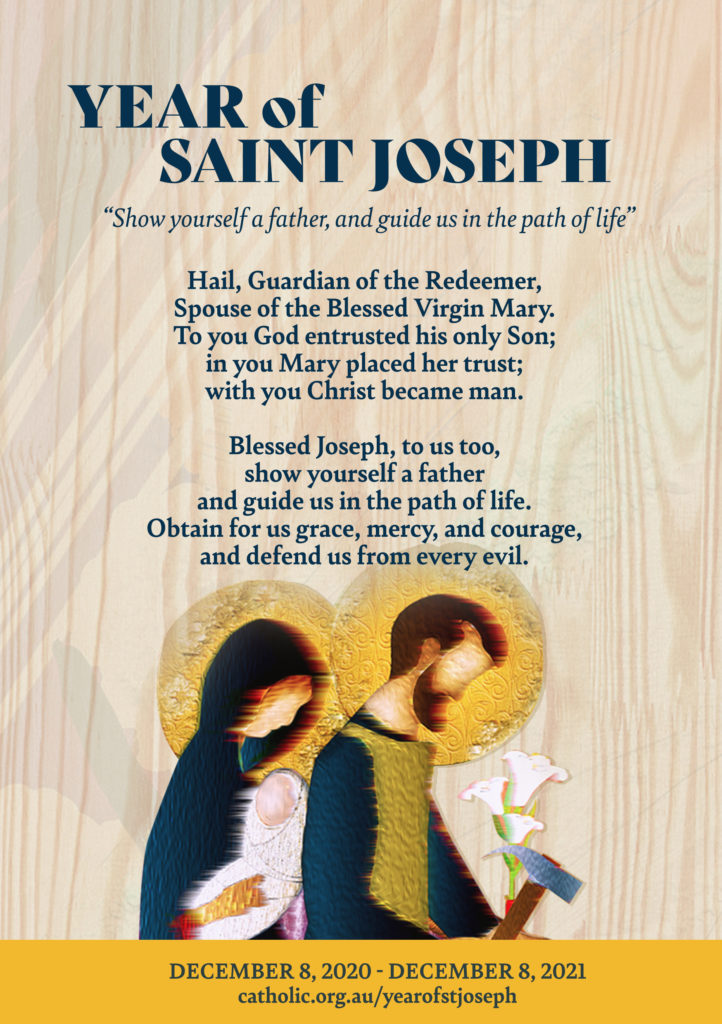On 8 December 20202, Pope Francis published an Apostolic Letter Patris corde (With a Father’s Heart), commemorating the 150th anniversary of the declaration of Saint Joseph as Patron of the Universal Church. To mark the occasion, the Holy Father has proclaimed a “Year of St Joseph”, running from December 8, 2020 to December 8, 2021.
The Australian Catholic Bishops Conference, to commemorate the Year of St Joseph, will be releasing a reflection on the various aspects of St Joseph’s life and character each month throughout 2021.
St Joseph, Attentive to the Word
“When the time came for their purification according to the law of Moses, they brought him up to Jerusalem to present him to the Lord.” – Luke 2:22
Luke 2:22 shows that Joseph and Mary saw to it that, in every possible way, Jesus’ birth and early life were conducted according to the will of God. The Gospel of Luke focuses more strongly on Mary, the mother of Jesus, than on her betrothed husband, Joseph. Nevertheless, by the time we hear this verse, early in the Gospel, we have learned some important facts about Joseph.
First, Joseph, who was betrothed to Mary, a virgin, was of the house and family of David (see Lk 1:27; 2:4). This means that Joseph traced his family tree back to the divinely chosen, anointed king of Israel: David. As an anointed king, David was, in the Hebrew language, a “messiah”. As a result, any son of Joseph would be counted not only as a descendant of David, but potentially a messiah.
However, six centuries before the time of Jesus, David’s messianic line had been exterminated. Since that time, the people of Israel had been waiting for God to provide them with another messiah who would bring a new time of great peace (see Isa 11:1-18). For this reason, Luke and the three other Gospels work very hard to show that Jesus is a legitimate son of David and thus the long-awaited messiah.
Second, Luke does not explain as the Gospel of Matthew does (see Matt 1:18-25) why Joseph decides to stay with Mary, who is pregnant before they are formally married. He simply states that Joseph went to Bethlehem to be registered in a census, going “with Mary to whom he was engaged and who was expecting a child” (Lk 2:5). A few verses later (Lk 2:16), we are told that the shepherds found Joseph with Mary following the birth of Jesus. Culturally, a child was honourable when it was recognised and named by the father. Joseph, who Luke says was thought to be the baby’s father (see Luke 3:23), allows the child to be named “Jesus” (Lk 2:21) as the angel who appeared to Mary had instructed (Lk 1:31).
All these actions by Joseph show that he is a man of his word who has remained with the woman to whom he is engaged, despite a pregnancy for which he is not responsible. More than that, he has seen that woman through childbirth in hard circumstances and has given her and her son a respectable identity in the world.
All these small pieces of information, when put into the larger, divine scheme of events that Luke offers us, also suggest that Joseph is a man with a distinct role in God’s desire to restore the world to right relationship with Godself. Joseph’s descent from King David, the anointed one, makes it possible for Jesus, despite his humble birth, to be truly the long-awaited Messiah of the Jewish people. While he does not know the full picture, by choosing generously and courageously to accept Mary as his betrothed in difficult circumstances, Joseph enables God’s will to be fulfilled.
More than this, Luke 2:22 indicates that Joseph is, in fact, a devout Jewish man who intentionally lives by God’s word. The verse states that Joseph and Mary deliberately made an arduous journey to Jerusalem to complete the requirements of the law of Moses for a new-born son.
To understand this verse we need to do two things. First, we need to read it in context, as part of a long sentence that goes to the end of v. 24. Second, to receive the rich meaning of these verses we need to be aware of Old Testament texts, the Word of God, that are referred to in Luke 2:22-24.
First, then, although the sentence of verses 22-24 begins and ends talking about the religious purification of a mother after giving birth as required by the Jewish law (see Lev 12:6), the main statement of the sentence is that Joseph and Mary brought Jesus to Jerusalem to present him to the Lord, according to a particular law of the Lord (Exod 13:2, 12, 13), which is quoted for us in the middle of the sentence. There are also other Old Testament texts that may be echoed in this presentation of Jesus to the Lord, especially the story of Hannah presenting her son Samuel to the Lord in 1 Sam 1:24-28 (but see also Exod 22:29; Neh 10:35-36).
Thus, Joseph and Mary perform two religious acts when they take Jesus to Jerusalem: they present Jesus to the Lord and they also offer a sacrifice for the purification of the mother of Jesus. Both of these acts are based in the Word of God. In fact, in the course of verses 22-24, Luke refers three times to God’s Word, calling it “the law of Moses,” and twice “the law of the Lord.” Clearly, Joseph is presented as responding most attentively to the Word of God as expressed in the Scriptures.
The most important result of Mary and Joseph’s actions is that, from his very birth and introduction into the world, Jesus is fully righteous according to God’s Word and is shown to be, potentially, the Messiah. Joseph, our point of interest, is presented as responding most attentively to the Word of God as stated in the Scriptures. Moreover, in his decision to stay faithful to Mary and her child, Joseph is portrayed for us in the Gospel of Luke as a man who cooperates courageously with God’s will, by discerning it in the events occurring around him, about which he has to make real-life decisions.
Joseph is a wonderful model for Christians as we live in the world. The Word of God spoken in the Scriptures guides us, but many times we have to apply that Word in everyday situations where we must see the reality around us, decide what God desires us to do and then act courageously, justly and with compassion. Joseph shows us how to be persons of the Word of God, whether it is written in books or in the face of God’s creation, unfolding in history.
Michele A. Connolly RSJ is a Scripture scholar who teaches New Testament Studies at the Catholic Institute of Sydney.
With thanks to the ACBC.









